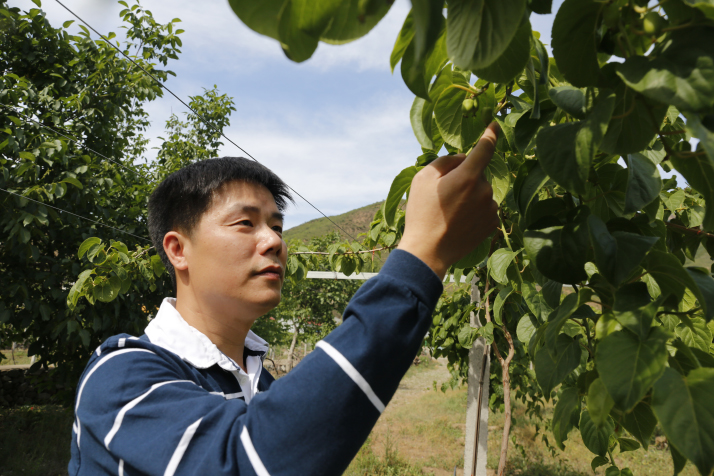Fields of Hope
Beijing Review,March 02, 2019 Adjust font size:

Shen Zhen, the initiator of the kiwiberry project in Lijia Village, Mentougou District of Beijing, at an orchard on June 18, 2017 (COURTESY PHOTO)
Tucked in the mountains in southwest Beijing, Lijia Village in Qingshui Town of Mentougou District was a relatively poor area of the capital. But in recent years, its fate has been changed by a miniature fruit called kiwiberry.
The fruit, nicknamed Thumbelina by locals after the girl born from a flower in Hans Christian Andersen's fairytale, has brought income and hope to villagers.
"Last year, approximately 25,000 kg of kiwiberry were sold, generating a total income of nearly 3 million yuan ($445,000)," Shen Zhen told Beijing Review. Shen is the founder of the Qingshui Yunfeng Fruit Company that introduced the fruit into the village.
"So far, about half of the villagers have gotten out of poverty through kiwiberry cultivation, and our goal is to lift the entire village out of poverty this year," Shen said.
Lijia's progress in alleviating poverty dovetails with the national picture. Data released by the National Bureau of Statistics on February 15 showed that by the end of 2018, 13.86 million people in rural areas were lifted out of poverty, with 16.6 million people still living in poverty. The rural poverty incidence was slashed to 1.7 percent, which was 1.4 percentage points lower than the previous year.
Various innovative methods have been adopted for rural areas to shake off poverty, including the use of new technology, profit-sharing incentive schemes and business models.
Fresh plant varieties
Lijia residents used to subsist on crop farming. Villager Liang Hongyi said his family once grew corn, millet and soybean on their one-third-hectare land, which fetched an annual income of less than $100. But now, Liang leases the land to the Qingshui Yunfeng Fruit Company for 3,000 yuan ($445) per year and he also earns a salary from the company for tending the kiwiberry.
In Beijing's supermarkets, kiwiberries—usually imported from New Zealand—are sold at an exorbitant price of about $45 per kg. Shen, who used to work in the financial industry, learned about the plant variety in 2012 during an executive training and decided to set up a company to grow it. After visiting many villages, he decided to set up a production base in Lijia. The company invited Zhong Caihong, a research fellow with the Wuhan Botanical Garden of the Chinese Academy of Sciences, to be its lead advisor.
In 2013, the village began to plant kiwiberry. It was chosen because of its climate, soil conditions, pollution-free environment and proximity to the consumer market, Shen said.
That spring, rows of seedlings were planted in the fields at the foot of the mountains hugging Lijia for the first time. Organic fertilizers were applied and a drip irrigation system was installed to nourish the seedlings. Branches expanded with exuberant leaves to the joy of the people involved, Shen recalled.
However, a cold spell killed one third of the seedlings that year, and after patiently waiting three years, villagers finally spotted greenish yellow flowers blooming on the branches.
That summer, they harvested the first batch of fruit, which brought in more than 1 million yuan ($148,000). Village chief Zhao Guilu said in 2016, 51 poor households in the village were lifted out of poverty by the project.
In November 2017, the Wuhan Botanical Garden, the science committee of the Mentougou District Government and Shen's company signed an agreement to set up a kiwiberry expert work station. The three sides agreed to cooperate in the training of technical personnel, the introduction and utilization of germplasm resources, and various planting techniques, among other things. Shen expects the work station to continue to come up with new plant varieties and improve the taste of the kiwiberry.

Yang Fan, head of Shaji Town in Suining County of Jiangsu Province, learns about business performance at a factory on October 16, 2018 (XINHUA)
More incentives
While Lijia has changed its fate by introducing a new plant variety, Beishan Village in Lijie Town, Zhouqu City of Gansu Province, has introduced new incentives to boost the production of herbal medicinal materials.
In recent years, the village has carried out a three-pronged reform to change resources into assets, change funds into shares and change farmers into stockholders. The policy encourages farmers to voluntarily invest their assets, money and skills in rural cooperatives in return for dividends and rent, and a salary if they also work for the cooperatives.
In November 2018, Xinyuanxin, the local farmers' cooperative specializing in the production and marketing of traditional Chinese medicinal materials, held a dividend-distributing ceremony where 26 households were paid a total of 22,000 yuan ($3,275).
Now, poverty-stricken villagers say they are happy that by investing poverty-alleviation funds in the cooperative, they have not only increased their income, but also enhanced their status to become shareholders and gotten closer to their dream of leaving poverty behind.
Similar reform has been carried out in many places across the country. On December 24, 2018, the Ministry of Agriculture and Rural Affairs, along with another five related ministries and commissions, issued a guiding opinion on converting land-use rights to stocks in agricultural businesses. The document stated that the conversion of land-use rights to shares should be given an important role in poverty alleviation. It also said that poverty alleviation fund can be converted into shares for poor villagers as long as the purpose of the fund is not changed.
New channels
Another important factor contributing to rural development and poverty alleviation is the development of the e-commerce industry. In 2018, e-commerce lifted all residents in 43 villages of Heze City in east China's Shandong Province out of poverty, according to a report on Taobao Villages in China released by Ali Research on October 27.
Taobao Villages are those with annual e-commerce transactions of over 10 million yuan ($1.48 million) and more than 100 online stores. In 2018, the number of Taobao Villages in China exceeded 3,200, with total annual sales over 220 billion yuan ($32.7 billion).
In Suining County of east China's Jiangsu Province, approximately one third of the labor force is currently involved in e-commerce, which contributed more than 50 percent of the increase in farmers' income in 2017, according to Ali Research.
Four decades ago, Suining's Shaji Town, with limited land, was a poor area. After reform and opening up, waste plastic processing gradually became its economic mainstay. In 2006, the county's first batch of e-commerce stores were opened by Sun Han, a fine arts teacher, Chen Lei, former manager of a mobile communication company, and Xia Kai, a photo studio owner. The three decided to produce foreign-style furniture together. In 2007, they set up a furniture factory, making and selling the products, which brought them hefty profits and attracted other villagers to follow suit. In 2016, all villages in Shaji turned into Taobao Villages, and now furniture making has become the county's backbone industry, according to Ali Research.
Shen Zhengping, Executive President of the Research Institute of Jiangsu Normal University, said Shaji's experience in rural e-commerce development is inspiring for poverty alleviation in underdeveloped areas.
The number of rural poor has decreased by 82.39 million since 2012 when the 18th National Congress of the Communist Party of China was held. In 2018, 13.86 million rural people were lifted out of poverty. As of the end of 2018, 16.6 million rural people were still living in poverty; but the incidence of rural poverty in all provinces had dropped below 6 percent and in 23 provincial-level administrative units had fallen under 3 percent.